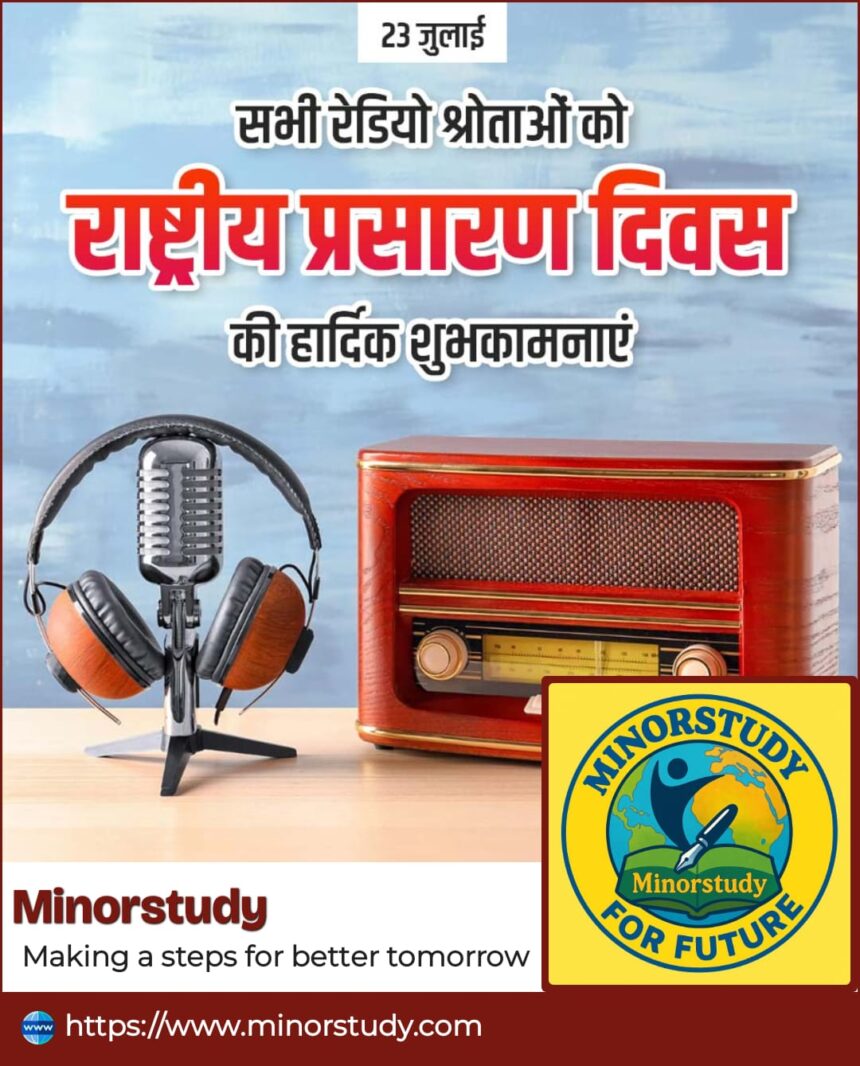📻 7 Powerful Reasons Why National Broadcasting Day Deserves More Respect in India
In a world dominated by smartphones and social media, we often forget the role traditional broadcasting has played in shaping modern India. Every year, National Broadcasting Day is observed on July 23rd to commemorate a historical event that laid the foundation of radio as a public service in India.
- 🎙️ What is National Broadcasting Day?
- 📜 History of National Broadcasting Day
- 🧠 Interesting & Lesser-Known Facts
- 🧭 Significance of National Broadcasting Day
- 💬 Frequently Asked Questions (FAQs)
- Q1. Why is National Broadcasting Day celebrated on July 23?
- Q2. What is All India Radio (AIR)?
- Q3. How is AIR different from private FM stations?
- Q4. Is radio still relevant in the age of podcasts?
- Q5. Who controls AIR today?
- 🙌 Observance and Celebrations
- ❤️ Human Perspective: How Broadcasting Changed Our Lives
- 🗝️ Important Points to Remember
- 🎉 Wishing Messages for National Broadcasting Day
- 🧭 Why National Broadcasting Still Matters in a Digital World
- 🔚 Conclusion: A Voice That Shaped A Nation
While it might not get the buzz of other national observances, this day represents a silent yet powerful revolution in communication that educated, informed, and united a diverse nation. Let’s dive into the rich history, fascinating facts, significance, and emotional value of this remarkable day.
🎙️ What is National Broadcasting Day?
National Broadcasting Day in India is observed on July 23rd every year to mark the first-ever radio broadcast in India, made by the Indian Broadcasting Company (IBC) from Bombay (now Mumbai) in 1927. It was a humble beginning but eventually evolved into All India Radio (AIR), one of the largest broadcasting organizations in the world.
This day is a tribute to the evolution of mass communication, the pioneers of Indian radio, and the unifying power of the airwaves.
📜 History of National Broadcasting Day
Let’s rewind to the early 20th century.
Timeline of Key Milestones:
| Year | Event |
|---|---|
| 1923 | First experimental broadcasts in Bombay and Calcutta |
| July 23, 1927 | Indian Broadcasting Company makes the first formal broadcast from Bombay |
| 1930 | Indian Broadcasting Company taken over by the Government of India |
| 1936 | Rebranded as All India Radio (AIR) |
| 1947 | AIR becomes the voice of independent India, broadcasting the momentous speech by Pandit Nehru: “Tryst with Destiny” |
| 1957 | Launch of Vividh Bharati, a service dedicated to entertainment and music |
| 2002 | Prasar Bharati becomes India’s autonomous public broadcaster |
| Today | AIR broadcasts in over 22 languages and 179 dialects across the nation and abroad |
🧠 Interesting & Lesser-Known Facts
📻 The first radio broadcast in India happened 96 years ago, on 23rd July 1927.
🎙️ AIR (Akashvani) has a reach of over 99% of India’s population.
🌐 It broadcasts in more than 450 stations across India.
📡 AIR introduced Educational Radio, Farmers’ Broadcasts, and Yuva Vani (youth-centric shows) to engage specific groups.
🌍 External Services Division of AIR reaches over 100 countries, showcasing India’s culture and diplomacy.
🎵 The timeless radio program “Mann Ki Baat” by PM Narendra Modi revived radio’s emotional connect with the public.
🕊️ AIR was the first broadcaster to announce Mahatma Gandhi’s assassination in 1948.
🧭 Significance of National Broadcasting Day
Why is it still relevant in the 21st century?
While today’s media is largely digital, the core values of public service broadcasting—truth, education, diversity, and inclusivity—remain timeless. National Broadcasting Day is a reminder of how radio and public broadcasting shaped the consciousness of India.
🎓 Educated the Masses: In the pre-TV era, it was AIR that taught India about health, governance, science, and culture.
🎶 Preserved Cultural Heritage: Radio kept classical music, folk tales, and regional languages alive.
📰 Real News over Noise: It maintained credibility and depth in reporting, unlike modern infotainment.
🧩 Unity in Diversity: Programs were broadcast in multiple dialects, reaching remote villages and urban cities alike.
📢 Platform for Public Voices: AIR gave voice to farmers, poets, thinkers, and leaders.
💬 Frequently Asked Questions (FAQs)
Q1. Why is National Broadcasting Day celebrated on July 23?
Because on July 23, 1927, the Indian Broadcasting Company made its first official radio broadcast from Bombay.
Q2. What is All India Radio (AIR)?
AIR, also called Akashvani, is India’s national public radio broadcaster under Prasar Bharati, with the mission to inform, educate, and entertain.
Q3. How is AIR different from private FM stations?
AIR focuses on public service, including educational, rural, and national programs, while private stations mostly emphasize entertainment.
Q4. Is radio still relevant in the age of podcasts?
Absolutely. Radio still holds massive relevance in rural India, in emergency communication, and public outreach programs.
Q5. Who controls AIR today?
AIR operates under Prasar Bharati, an autonomous body formed in 1997.
🙌 Observance and Celebrations
While there are no grand parades or public holidays, National Broadcasting Day is marked by:
🎧 Special broadcasts on AIR reflecting its legacy and future vision.
🎤 Panel discussions and seminars hosted by Prasar Bharati and journalism institutions.
📚 Media literacy campaigns in schools and colleges.
🏅 Tributes to iconic broadcasters and radio journalists.
🎶 Special musical programs on Vividh Bharati and FM Gold.
These events aim to ignite interest among youth and recognize the unsung heroes behind the microphone.
❤️ Human Perspective: How Broadcasting Changed Our Lives
From news bulletins that shaped our understanding of world events to late-night storytelling shows that gave us comfort, radio has touched every Indian heart in some way.
In Our Daily Lives:
🔊 Morning Devotional Programs became a spiritual start to many households.
🎙️ Emergency Broadcasts during floods, earthquakes, or war kept families safe.
📻 Radio Counseling helped students and farmers make better life decisions.
🌱 Krishi Darshan-style programs helped farmers increase productivity.
🧓 Elderly citizens still rely on AIR for its reliable news and music.
In a world of visual overload, radio remains an intimate and reflective medium, engaging the listener’s imagination and empathy.
🗝️ Important Points to Remember
✅ Date: 23rd July
✅ First broadcast: Indian Broadcasting Company, 1927
✅ Current body: Prasar Bharati
✅ Core medium: All India Radio (Akashvani)
✅ Mission: Public education, cultural unity, emergency communication
✅ Reach: Over 99% of India’s population
✅ Languages: 22+ languages and 179 dialects
✅ Legacy: News, music, drama, health, rural empowerment, national unity
🎉 Wishing Messages for National Broadcasting Day
Here are a few thoughtful wishes to celebrate the occasion:
“On National Broadcasting Day, let’s tune into the voice of India that has united generations—AIR!”
“Wishing all broadcasters, radio lovers, and public service warriors a very Happy National Broadcasting Day!”
“From radio sets to mobile apps, may broadcasting continue to inspire, educate, and empower us all.”
“Let’s celebrate the humble medium that changed India’s social and cultural landscape—Happy National Broadcasting Day!”
🧭 Why National Broadcasting Still Matters in a Digital World
In today’s chaotic and often misleading media ecosystem, the principles on which broadcasting was founded—truth, simplicity, responsibility, and reach—are more needed than ever.
Radio doesn’t demand your eyes; it demands your ears and imagination. It creates space for thought, conversation, and connection. It doesn’t chase trends—it sets standards of authenticity and inclusion.
🔚 Conclusion: A Voice That Shaped A Nation
As we move further into the digital age, we must never forget the role of broadcasting in shaping the India we know today. From announcing freedom to nurturing democracy, from storytelling to agricultural support—radio and public broadcasting have been the silent mentors of a nation.
Let’s use National Broadcasting Day to revisit, respect, and revive the values of responsible communication and truthful storytelling. It’s not just a day—it’s a tribute to voices that shaped generations, connected hearts, and informed minds.








